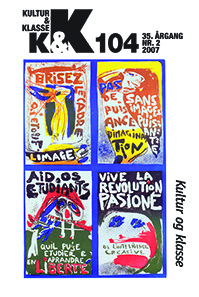Marx’ spøgelser ifølge Derrida
DOI:
https://doi.org/10.7146/kok.v35i104.22289Nøgleord:
Marx, spøgelser, Derrida, Kirkegaard, Shakespeare, SartreResumé
– med afstikkere til Kierkegaard, Shakespeare og Sartre
Marx’ ghosts according to Derrida: With sideglances at Kierkegaard, Shakespeare and Sartre
The article is about Jacques Derrida’s Spectres de Marx [Specters of Marx, hereafter Spectres] which is his most elaborate statement on Marx and Marxism. In this work, the phenomena of ghosts and haunting play a very significant role. Derrida connects ghosts to a fundamental anachronism, something he underscores by emphasizing and generalizing Hamlet’s line in Hamlet: »The time is out of joint«. The concept of the ghost is also generalized and Derrida calls for the formation of a couple of novel sciences: spectralogy and hauntology. Spectres had a significant and immediate effect; the work became the object of heated debate amongst Marxist scholars and books and articles about especially literary and psychoanalytic ghosts proliferated in its wake.
After introducing Spectres, the article focuses upon the Marxist critique of the work offered by Richard Halpern, arguing that Halpern ignores the question of language and therefore misses the point of Derrida’s reading of Marx (and perhaps also of Hamlet). Then follows a discussion of the section in Spectres on the relationship between use and exchange-value and thereby also on the famous dancing table in Marx’s Capital. Via a detour to Sartre it is suggested that the concept of the imaginary is of importance in relation to Derrida’s understanding of the dance of the table. This is elaborated via another detour, this one to Kierkegaard’s The Concept of Anxiety, which is motivated by the fact that nothingness is a key constituent of the conception of the imaginary in Sartre and of anxiety in Kierkegaard.
Nothingness is quite as central to Kierkegaard’s conception of irony, while irony is also linked to haunting in Kierkegaard’s The Concept of Irony. This fact is explored in the final part of the article which also draws parallels between the relationship between language and the market in Spectres and Kierkegaard’s Fear and Trembling. The conclusion is that Derrida focuses on the nothingness of ghosts and the imaginary in order to sound a warning against the formation of rigid conceptions of human history and the history of human labour which Marxism more often than not has constructed.
Downloads
Publiceret
Citation/Eksport
Nummer
Sektion
Licens
Tidsskriftet følger dansk ophavsret.





